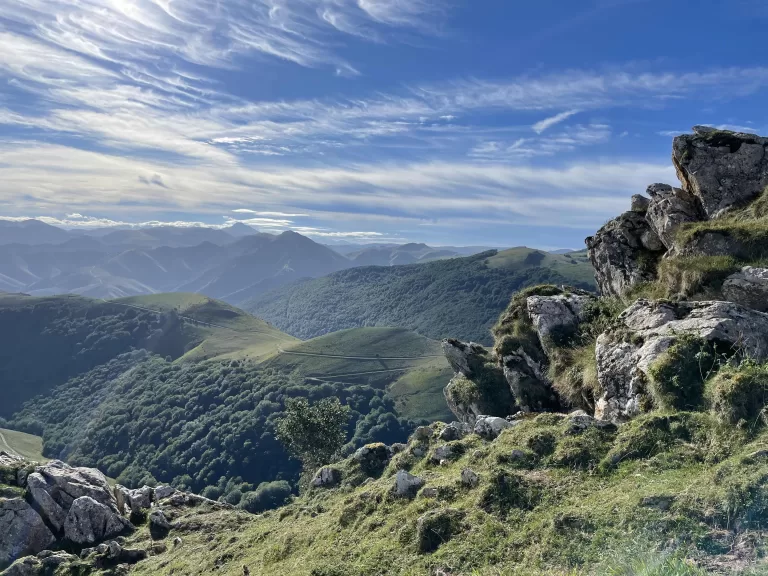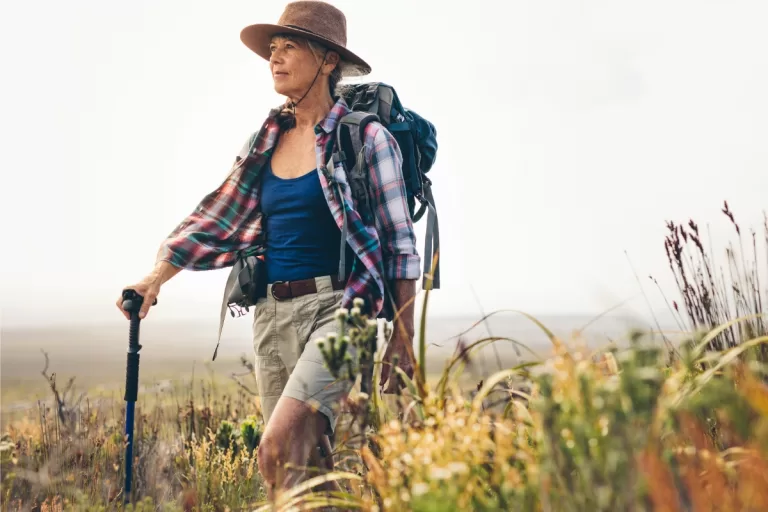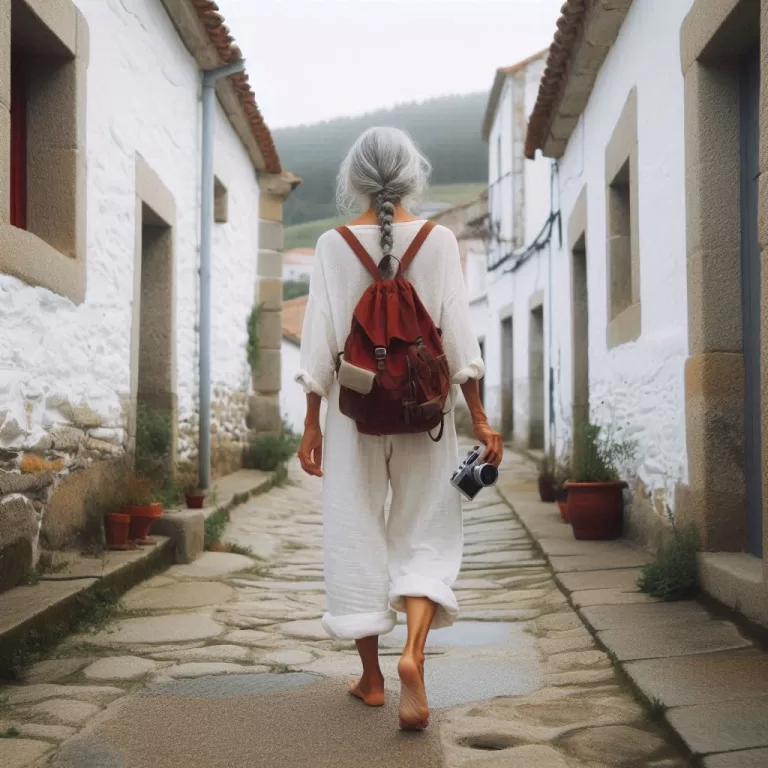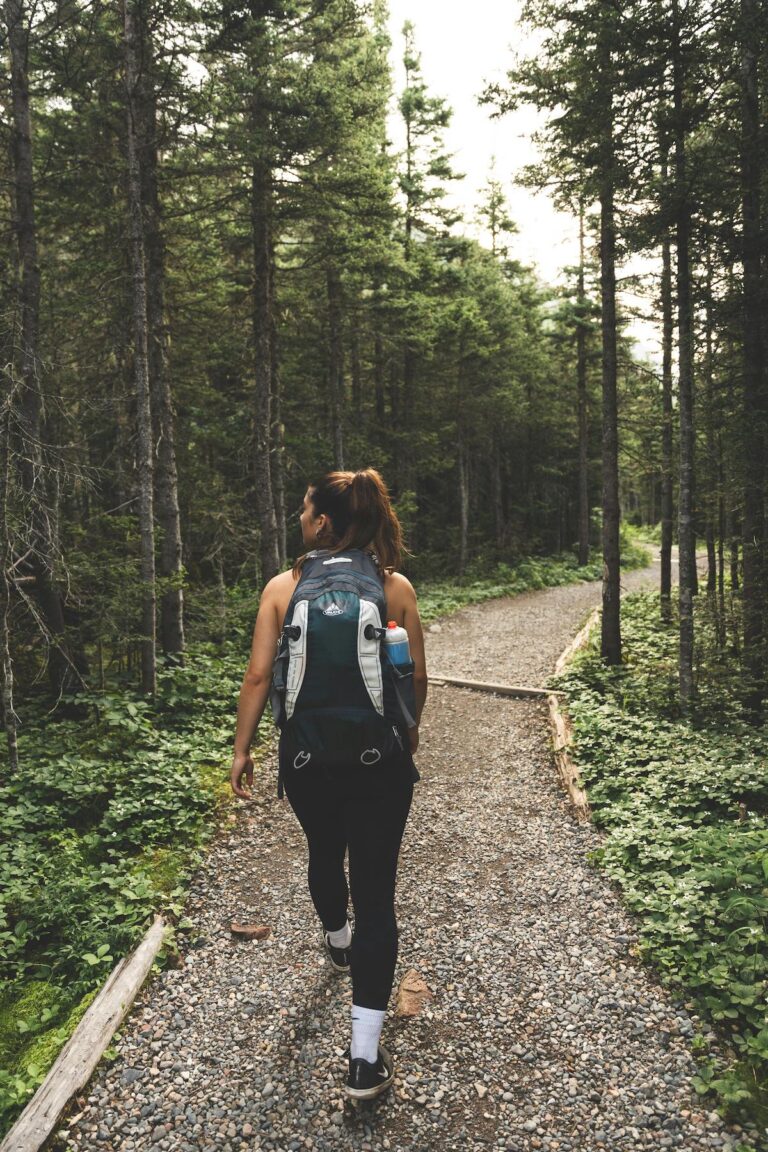Long-Distance Hikes And Neurodivergent Women
Is Long-Distance Trekking Appropriate For Neurodivergent Women?
Absolutely! Discover the healing power of long-distance treks and why neurodivergent women thrive on trails like the Camino de Santiago, the Pacific Crest Trail, the Appalachian Trail, and other lengthy walks.

Table of Contents
- Understanding Neurodivergence
- The Universal Benefits of Walking
- Why Long-Distance Treks Are Ideal for Neurodivergent Women
- The Camino de Santiago: A Path of Pilgrimage and Community
- The Pacific Crest Trail: An Epic Wilderness Adventure
- The Appalachian Trail: A Journey Through History and Nature
- Specific Benefits for Neurodivergent Women
- Practical Tips for Neurodivergent Women on Long-Distance Treks
- Conclusion: Embrace the Journey
- Additional Reading: Recommended Books for Walking Women
In a world that often feels overwhelming and chaotic, finding solace and a sense of accomplishment can be particularly challenging for neurodivergent individuals, especially women. Long-distance treks like the Camino de Santiago, the Pacific Crest Trail, and the Appalachian Trail offer unique opportunities for adventure, self-discovery, and healing. This article explores why these trails are ideal for neurodivergent women, emphasizing the physical and mental health benefits of walking, as well as the specific advantages for the neurodivergent community.
Understanding Neurodivergence
Neurodivergence refers to variations in the human brain regarding sociability, learning, attention, mood, and other mental functions. Conditions such as HSP, ADHD (Attention Deficit Hyperactivity Disorder) and autism are common examples. Neurodivergent individuals often face unique challenges and possess distinctive strengths, making traditional environments and activities sometimes less accommodating to their needs.
The Universal Benefits of Walking
First of all, let’s talk about Walking! Walking is magic, in my opinion. It’s a fundamental human activity with profound physical and mental health benefits, making it an accessible form of exercise for many.
Physical Health Benefits
- Improved Cardiovascular Health: Regular walking strengthens the heart, reduces blood pressure, and improves circulation, lowering the risk of heart disease.
- Weight Management: Walking helps maintain a healthy weight, reducing the risk of obesity and related conditions like type 2 diabetes.
- Enhanced Muscular and Skeletal Health: It improves muscle tone, strengthens bones, and enhances joint flexibility, reducing the risk of osteoporosis and arthritis.
- Boosted Immune System: Consistent walking can boost the immune system, making the body more resilient against illnesses.
Mental Health Benefits
- Stress Reduction: Walking, especially in nature, reduces cortisol levels, alleviating stress and anxiety. This is huge for women with already overstimulated nervous systems.
- Enhanced Mood: Physical activity triggers the release of endorphins and serotonin, which are natural mood lifters.
- Improved Sleep: Regular walking regulates the sleep-wake cycle, helping to overcome insomnia and improve sleep quality.
- Cognitive Benefits: Walking stimulates brain function, improving memory, concentration, and creativity.
Why Long-Distance Treks Are Ideal for Neurodivergent Women
Structured Freedom
Long-distance treks offer a unique combination of structure and freedom. Trails like the Camino de Santiago, the Pacific Crest Trail, and the Appalachian Trail provide clear paths and goals, yet allow hikers to set their own pace and schedules. This balance can be particularly beneficial for neurodivergent individuals, who may thrive with a mix of routine and flexibility.
- Routine and Predictability: The daily rhythm of walking, setting up camp, and resting provides a predictable routine, reducing anxiety and stress, especially for women on the autistic spectrum.
- Personal Autonomy: Hikers can choose how far to walk each day, where to stop, and how to manage their time, catering to individual energy levels and needs.
Sensory Experiences
Nature offers a rich tapestry of sensory experiences that can be soothing or stimulating for neurodivergent individuals, depending on their preferences.
- Visual Stimulation: The changing landscapes, from forests to mountains to meadows, provide a visual feast without the overwhelming chaos of urban environments. Keep in mind, that although there are many natural areas on the Camino de Santiago, it does pass through several large cities. I tend to pass quickly through these areas if I am feeling overwhelmed.
- Auditory Relief: Natural sounds such as birdsong, rustling leaves, and flowing streams can be calming, reducing sensory overload.
- Tactile Comfort: The textures of nature, whether it’s the feel of tree bark, grass underfoot, or the coolness of a mountain stream, offer grounding sensory input.
- Olfactory Stimulation: The scents of pine forests, wildflowers, and fresh air can be both invigorating and calming.
Physical and Mental Challenge
Long-distance hiking is physically demanding, offering a sense of accomplishment and enhancing self-esteem, which is crucial for neurodivergent individuals who often face societal stigmatization.
- Physical Endurance: Building physical stamina and resilience through long hikes can lead to a stronger body image and self-confidence.
- Mental Resilience: Overcoming the challenges of the trail fosters a growth mindset, helping neurodivergent women build mental toughness and adaptability.
- Problem-Solving Skills: Navigating trails, managing supplies, and dealing with unexpected situations enhance cognitive flexibility and problem-solving abilities.
The Camino de Santiago: A Path of Pilgrimage and Community
The Camino de Santiago, a network of ancient pilgrim routes leading to the shrine of the apostle Saint James in Santiago de Compostela, Spain, is renowned for its spiritual and communal aspects.
The Spiritual Journey
For many, the Camino is not just a physical journey but a spiritual one, offering time for introspection and personal growth.
- Mindfulness and Meditation: Walking the Camino encourages a meditative pace, allowing hikers to focus on the present moment and cultivate mindfulness.
- Personal Reflection: The solitude of walking long distances provides ample time for self-reflection and personal insight.
A Sense of Community
The Camino is famous for its camaraderie and the supportive community of fellow pilgrims.
- Social Interaction: The shared experience of the pilgrimage fosters a sense of belonging and mutual support, which can be particularly comforting for neurodivergent individuals. It provides ample stimulation and novelty for those who need it, but there is no requirement to join in for the introverted and HSP.
- Cultural Exchange: Meeting people from diverse backgrounds enhances social skills and broadens perspectives, offering rich cultural and interpersonal experiences.
Personal Anecdotes
Marta’s Journey: Marta, a 32-year-old woman with ADHD, shared how the Camino de Santiago helped her find focus and peace. “The routine of walking every day and the simplicity of carrying only what I needed made it easier to manage my symptoms. I felt a sense of clarity and purpose that I had never experienced before.”
Elena’s Reflection: Elena, diagnosed with autism, found the Camino a transformative experience. “The predictability of the daily schedule and the supportive community made me feel safe and accepted. I made friends who understood me, and I discovered a new sense of confidence in social interactions.”
The Pacific Crest Trail: An Epic Wilderness Adventure
Stretching over 2,650 miles from Mexico to Canada through California, Oregon, and Washington, the Pacific Crest Trail (PCT) offers an immersive wilderness experience.
Immersion in Nature
The PCT traverses some of the most stunning and diverse landscapes in the United States, from deserts to mountain ranges.
- Connection to Nature: Extended time in nature helps develop a deep connection to the environment, fostering a sense of peace and well-being.
- Wildlife Encounters: Observing wildlife in their natural habitats can be both thrilling and educational, enhancing the sensory experience.
Physical and Mental Challenges
The PCT is known for its rigorous terrain and varying climates, providing a formidable challenge.
- Physical Strength: The demanding nature of the trail builds physical endurance and resilience.
- Mental Toughness: The challenges of the PCT require determination and mental fortitude, helping hikers develop greater psychological strength.
- Self-Reliance: Navigating the trail and managing resources independently boosts self-confidence and self-sufficiency.
Personal Anecdotes
Amy’s Adventure: Amy, a 28-year-old woman with ADHD, found the PCT to be a life-changing journey. “The constant physical activity helped me channel my energy productively, and the beauty of the trail kept me engaged and focused. The PCT taught me how to be patient with myself and embrace the journey rather than the destination.”
Sarah’s Strength: Sarah, who is autistic, described her PCT experience as empowering. “The solitude of the trail allowed me to recharge and process my thoughts without the pressure of social expectations. The PCT pushed me beyond my limits, and I emerged stronger and more self-assured.”
The Appalachian Trail: A Journey Through History and Nature
The Appalachian Trail (AT), running about 2,200 miles from Georgia to Maine, is one of the oldest long-distance hiking trails in the United States, rich with history and natural beauty.
Historical and Cultural Significance
The AT passes through numerous historical sites and small towns, offering a unique blend of natural and cultural experiences.
- Cultural Engagement: Hikers can explore the historical significance of the trail and its surrounding areas, enriching their journey with educational experiences.
- Local Communities: Interaction with the small towns along the trail provides opportunities for social engagement and cultural exchange.
Varied Terrain and Ecosystems
The AT’s diverse landscapes range from dense forests to alpine meadows, offering a dynamic hiking experience.
- Diverse Environments: The varied terrain keeps the hike interesting and engaging, reducing monotony.
- Ecological Education: Learning about different ecosystems and their flora and fauna can be intellectually stimulating and rewarding.
Personal Anecdotes
Rebecca’s Rediscovery: Rebecca, a 35-year-old woman with ADHD, shared how the AT helped her reconnect with herself. “The historical sites and diverse landscapes kept my mind stimulated and curious. I felt a deep sense of accomplishment with each milestone, which boosted my self-esteem and helped me manage my ADHD symptoms better.”
Natalie’s New Horizons: Natalie, diagnosed with autism, found solace on the AT. “The natural beauty and the history embedded in the trail provided a sense of continuity and stability. The hiking community was welcoming and inclusive, allowing me to practice my social skills in a supportive environment.”
Specific Benefits for Neurodivergent Women
Enhanced Focus and Attention
Long-distance hiking can significantly improve focus and attention, especially for individuals with ADHD.
- Reduced Distractions: The natural environment is less distracting than urban settings, allowing for better concentration.
- Engagement with the Present: The demands of the trail require attention to the immediate surroundings, promoting sustained focus.
Emotional Regulation
Hiking helps regulate emotions, which is particularly beneficial for those with autism who may experience heightened emotional sensitivity.
- Calming Effects: The tranquility of nature and the rhythmic pace of walking can soothe the nervous system, reducing anxiety and stress.
- Emotion Processing: The solitude of the trail provides a safe space to process and manage emotions, leading to better emotional regulation.
Social Skills Development
The social aspects of long-distance treks can enhance social skills and reduce social anxiety.
- Low-Pressure Socialization: The hiking community is generally supportive and non-judgmental, providing a low-pressure environment for social interaction.
- Shared Interests: Common goals and experiences facilitate meaningful connections and friendships, enhancing social confidence.
Practical Tips for Neurodivergent Women on Long-Distance Treks
Planning and Preparation
- Research: Thoroughly research the trail, its requirements, and what to expect. Knowing the logistics can reduce anxiety and increase confidence.
- Packing: Pack mindfully, ensuring you have all the necessary gear for either a Camino-style trip or a long-distance backcountry adventure without overloading. Include items that can help with sensory regulation, such as noise-canceling headphones or fidget tools.
On the Trail
- Pace Yourself: Listen to your body and mind, and don’t push yourself too hard. Take breaks when needed and enjoy the journey.
- Stay Connected: Keep in touch with friends or family for support and encouragement. Consider joining online forums or groups for hikers where you can share experiences and seek advice.
Self-Care
- Mindfulness Practices: Incorporate mindfulness or meditation practices into your daily routine to enhance your mental well-being. I wake early in hostels and take about 15 minutes to do a body scan style meditation before anyone else is up. I listen to some soothing nature music with earbuds.
- Healthy Eating and Hydration: Maintain a balanced diet and stay hydrated to keep your energy levels up and your body functioning optimally.
Conclusion: Embrace the Journey
Long-distance treks like the Camino de Santiago, the Pacific Crest Trail, and the Appalachian Trail offer neurodivergent women a unique blend of structure, freedom, challenge, and community. These trails provide not only physical health benefits but also profound mental and emotional growth. By immersing themselves in nature, embracing the journey, and connecting with a supportive community, neurodivergent women can find empowerment, healing, and a sense of belonging. Whether seeking solace, adventure, or self-discovery, these trails hold the promise of transformation and renewal. Embrace the journey and discover the extraordinary within yourself.
Additional Reading: Recommended Books for Walking Women
For further inspiration and guidance, here are a few recommended books written by women who have undertaken long-distance treks:
- “Windswept: Walking the Paths of Trailblazing Women” by Annabel Abbs: Women have always walked. Walking is in our “molecular memories,” Annabel Abbs insists in her new book Windswept, “carved indelibly into our DNA.” For thousands of years, women in hunter-gatherer societies walked as many as ten miles a day. And, once agriculture bound women to specific portions of land, women still walked to survive. Water, firewood, and food could only be gathered by walking, and women had to walk to visit family or friends and take wares to sell at the market. Women have walked to survive for as long as we have existed. * One of my favorite books of all times!
- “Hiking Through: One Man’s Journey to Peace and Freedom on the Appalachian Trail” by Paul Stutzman: Although written by a man, this book provides valuable perspectives on the emotional and spiritual journey that long-distance hiking can offer. It’s a powerful testament to the healing potential of nature and physical challenge.
- “The Salt Path” by Raynor Winn: This memoir recounts the story of Raynor and her husband, who walk the South West Coast Path in England after losing their home and receiving a terminal diagnosis. It’s an inspiring tale of resilience, love, and the therapeutic effects of walking.
- “Walking Home: A Pilgrimage from Humbled to Healed” by Sonia Choquette: The author undertakes the Camino de Santiago after a series of personal crises. Her narrative highlights the spiritual and emotional healing that can occur through the simple act of walking.
- “Wild: From Lost to Found on the Pacific Crest Trail” by Cheryl Strayed: A memoir of a woman who embarks on a solo hike on the PCT as a way to heal from personal loss and hardship. Strayed’s journey is both physically demanding and emotionally transformative, offering deep insights into the power of nature and self-discovery.
- “Thru-Hiking Will Break Your Heart: An Adventure on the Pacific Crest Trail” by Carrot Quinn: This book offers a raw and honest account of hiking the PCT, focusing on the physical and emotional highs and lows of long-distance trekking. It’s an inspiring read for anyone considering a similar journey.
Head over HERE for the full WOMEN AND WALKING booklist. (Coming Soon.)







